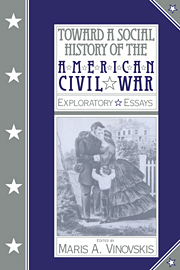Book contents
- Frontmatter
- Contents
- Introduction by Marts A. Vinovskis
- 1 Have Social Historians Lost the Civil War? Some Preliminary Demographic Speculations
- 2 Community and War: The Civil War Experience of Two New Hampshire Towns
- 3 The Northern Soldier and His Community
- 4 Voluntarism in Wartime: Philadelphia's Great Central Fair
- 5 The Civil War and Municipal Government in Chicago
- 6 Who Joined the Grand Army? Three Case Studies in the Construction of Union Veteranhood, 1866–1900
- 7 “Such Is the Price We Pay”: American Widows and the Civil War Pension System
- Index
5 - The Civil War and Municipal Government in Chicago
Published online by Cambridge University Press: 03 February 2010
- Frontmatter
- Contents
- Introduction by Marts A. Vinovskis
- 1 Have Social Historians Lost the Civil War? Some Preliminary Demographic Speculations
- 2 Community and War: The Civil War Experience of Two New Hampshire Towns
- 3 The Northern Soldier and His Community
- 4 Voluntarism in Wartime: Philadelphia's Great Central Fair
- 5 The Civil War and Municipal Government in Chicago
- 6 Who Joined the Grand Army? Three Case Studies in the Construction of Union Veteranhood, 1866–1900
- 7 “Such Is the Price We Pay”: American Widows and the Civil War Pension System
- Index
Summary
The Civil War brought machine politics to Chicago. The party realignment that created the Republican Party repoliticized municipal elections that had been nonpartisan for nearly a decade, while the war itself presented emergency situations that forced (or, alternatively, allowed) city officials to tax and spend on an unprecedentedly large scale. By machine politics, of course, I do not mean a Richard J. Daley style concentration of power; that kind of machine would not exist in Chicago until Daley himself built it in the 1950s. Rather, by machine politics I mean a form of city government with two characteristics: first, electoral conflict, consisting of an ongoing battle between “reformers” and “bosses,” often waged on the issue of “corruption,” and second, municipal finance structured so that the city treasury underwrote what political scientist Raymond E. Wolfinger has delicately called “incentives to political participation.” Before the Civil War, Chicago's government had neither of these characteristics.
It did, however, have a third characteristic that historians usually associate with machine politics: It was decentralized. Antebellum Chicago's radical administrative decentralization, which I have termed the “segmented system of city government,” was destroyed by the Civil War. A system designed to avoid the political redistribution of individual wealth was replaced by one – machine politics – that used its taxing and spending powers to pursue expensive “public interests.” Thus, the origin of machine politics lay not in a democratizing decentralization of power but in the addition of centralizing elements to an already decentralized government and, more important, in the political definition of those public interests for which redistribution was appropriate.
- Type
- Chapter
- Information
- Toward a Social History of the American Civil WarExploratory Essays, pp. 117 - 138Publisher: Cambridge University PressPrint publication year: 1990
- 3
- Cited by



